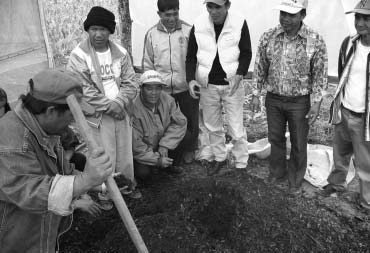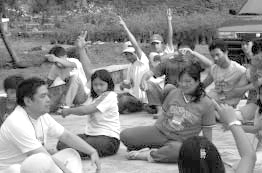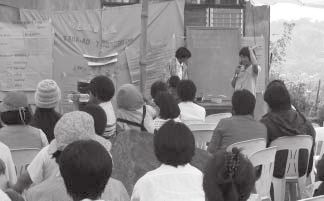Ramon Mapa
This is also a report from the Philippines, from a long-standing partner of DVV International. Ramon Mapa, Executive Director of the People’s Initiative for Learning and Community Development (PILCD), describes a community-based learning and development programme especially designed to motivate the rural population to participate actively in community activities. PILCD is a non-government organization engaged primarily in developing and implementing community-based education programs for farmers, out-of-school youths, and women’s self-help groups. For this project, PILCD was awarded the EAEA Grundtvig Award 2010 in May 2010. What can be learned from this project? What is good? Where are improvements needed? The author takes stock.
Community-based Learning: Building Capacities for Change
The Challenge
We are always confronted with apathy whenever we say that our program offers only learning and education. “We need money and capital, we don’t need training” is the typical remark we get from local community folk in remote rural areas where poverty incidence is high. In a hostile economic environment, an education program such as literacy is treated indifferently. Community programs that offer loans and micro-financing are in demand. The practical benefits and long term value of education is underrated. Likewise, with the day to day struggle for sub sistence, most poor rural communities are faced with challenges in terms of their capacities to learn as well as their time and energies to learn.
Whatever training and learning opportunities are presented, without directly ad-dressing immediate social and economic needs of the community, will be irrelevant; and whatever capitalization or community projects are provided will only be in vain since the capacities required are lacking. Thus, the challenge is to address both the development of their functional literacy vis-à-vis their social and economic productivity where learning is the key operational element.
The Framework
Under these circumstances, the Community-based Learning and Development Program was conceived in the frame of developing and implementing education activities in remote rural communities that will actively engage people in the wider social and community picture. It is a community-based education program where the central element is learning that is closely integrated with a micro economic, a community development project, or any other community initiative that addresses a specific issue or need.
The inclusion of processes in the learning program that directly address their need engages the learners in a participatory process that increases their capabilities for self help and collective activities. Likewise, these community actions, in collectively addressing their community problems and needs, provide a venue for people’s active participation in the planning and decision-making processes and engages them in a concrete action reflection experience. This integration is viewed as a means to facilitate a learning experience and outcome that is relevant, experiential and empowering.
Below are the program’s key operational principles:
- Individual, co-learning and collective learning takes place utilizing all forms, modes and methodology to facilitate learning.
- Community participation is enhanced and practiced in all the phases of the program. The learners themselves are in the best position to identify commu nity needs and wants as well as plan what, when and where their learning activities should be.
- Community involvement opportunities that are brought closest to where people live have the greatest potential for a high level of public participation. Thus, learning activities should take place in the community to make it accessible and ensure participation.
- Action-based – the learning theme revolves around addressing a specific community need or issue. People learn best by doing.
- The situational reality of the learners, immediate community and the larger national and global situation is utilized as a vast source of learning contents and resources.
- The social and economic realities of the learners serves as references to facilitate learners to face and study the reality of their problems – to actively engage them to look deeper and broader at their situations and decide and act to address these in their own terms; and
- Learning is the central element in the over-all process and outcomes.
The Practice and Approach
The program’s over-all process is a structured learning experience. The approach could be best described as an “action learning model” where learning by doing dominates the over-all learning process. In this approach, participants are engaged in simulated or actual project activities where they take part in the over-all project development process. Starting point is the learner’s social, political, economic and cultural realities and needs.
Before the start of the regular session, an analysis of the participants learning needs, levels and educational gaps are identified through group based activities and pre-test such as the Functional Literacy Test (FLT). Consultations with family members and the local government units and other agencies in the community are also held to solicit family and community support for the learners.
The preparation stage is in itself an educational and learning experience – both for learners, the community at large and the facilitators and program implement ers. Likewise, learners are involved in planning the learning calendar by choosing the days and times that best suit them. The results of these preparatory and consultative activities likewise serve as a material for the programs curriculum development.
The learning methodology applied mainly utilizes popular and participatory ap proaches using the ADIDS model – Activity-Discussion-Input Discussion-Synthesis. Learning activities range from the traditional lecture discussion to group based activities, games and creative arts, taking into consideration the participants learn ing styles and contexts.
Particular emphasis is placed on action-based learning where learners are situ ated in a particular real life situation or need of their community. This “hands-on” approach is intended to empower learners and allow them to make their own discoveries.

Composting training
Source: PILCD

Workshop with out-of-school youth
Source: PILCD
The Experience
The program started in 2003, primarily in three municipalities of the province of Benguet – one of the six provinces under the Cordillera Administrative Region (CAR). It is a mountainous area and home to various ethno linguistic tribes of the indigenous people of Northern Luzon, Philippines.
Major source of income in this area is the production of upland vegetables. The province is a major supplier in the country. But despite this fact, the certainty of sustained high income from vegetable farming is unpredictable. Several factors could adversely affect a harvest – typhoon, heavy rains and landslides, and more commonly, a glut of the same vegetable. The entry of cheap imported vegetables contributed more to the continuous dropping of vegetable prices causing income losses to farmers.
The program’s curriculum framework was anchored on five key learning areas:
(1) Literacy and numeracy – basic and functional; (2) Life skills – interpersonal and intrapersonal including communication skills; (3) Livelihood and productivity; (4) Critical thinking; and (5) Development perspectives – local and global.
To cater to the different learning interests and needs of the target learners, the program was clustered into three major themes. In each theme, the five key learning areas were integrated:
- Capacity development of grassroots organizations including provision of livelihood and income generating skills training
- Sustainable agriculture
- Basic education and literacy
To illustrate: community-based organizations and/or neighbourhood associations including women’s groups are more inclined to get involved in the first theme; individual and organized farmer groups are more involved in the second theme; and out of school youths and adults who wish to finish their secondary schooling are involved in the third theme.
Integrating the five learning areas within these themes, it is expected that the de velopment of the level of their functional literacy will contribute in the development of their individual and collective knowledge, skills and capabilities such as:
a) income generation
b) awareness raising, critical consciousness and empowerment
c) Self-help and community organizing
d) Self governance and political participation
e) Environmental protection, rehabilitation and sustainability
Sessions are held on a regular basis based on the learning contract with the target groups – either once or twice a week, or one week per month. Frequency of ses sions is decided based on the targeted learning outcomes and the current learning capacities of the participants.
Self-administered learning modules are also provided to the participants. In Buguias, where the theme for sustainable agriculture is most active, a small farmer learning center located in an organic demonstration farm is utilized.
Coordination and cooperation with local government units and other agencies including advocacy activities for the enhanced provision of community-based adult learning program are an integral part of the over-all program.
The program is linked with the government’s Accreditation and Equivalency (A&E) test administered by the Department of Education’s Bureau for Alternative
Learning System. Learners who wish to earn a high school education degree have the option to undertake the accreditation and equivalency (A&E) test: Those who pass are given certificates by the Department of Education as high school graduates which entitle them to continue higher education. It could also be used as a certificate for jobs requiring applicants to have at east finished their formal secondary education.
To date, the programs have yielded significant results in the areas of self-help initiatives under the first and second theme, such as the installation of a community water system project by a women’s community organization in Bayoyo – a village in Buguias, and a hog raising livelihood project by a mother’s organization in another village named Taba-ao. Both projects are a by-product of a continuing learning program on literacy and capacity building. The organizations members and officers underwent serialized training on leadership, organizational and project development. Learning sessions were held twice a month. The development of the two community projects involved the participants in the whole process of project development.
The training on sustainable agriculture initiated in 2003 resulted in the transformation of farmer participants to adopt sustainable farming practices such as composting and integrated pest management and to a lesser extent, the judicious use of chemical inputs. Two farmer participants in Buguias have fully converted to organic farming. Both are now marketing their organic produce.
A significant number of learners have passed the accreditation and equivalency (A&E) test since 2004 and most of those who can afford to have continued to pursue college education.

Taba-ao womens self help group
Source: PILCD


